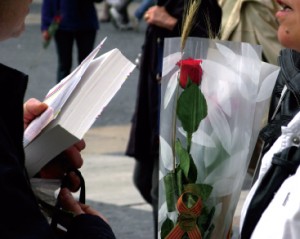Perhaps the single most astonishing thing about St. Jordi’s day is that it gets hundreds of thousands of people to browse and buy books. The fact that printed matter, the decline or disappearance of which has been declared inevitable so many times, should still hold such fascination for an entire country – albeit on just one day – suggests that books still have a role to play.
Saint George is the patron saint of 21 countries, England and Catalonia included. I don’t recall this dragon-slaughtering holy man’s day (April 23rd) being celebrated much in London (except by the odd – and perfectly missable – display of morris dancing). In Barcelona, by contrast, the date is commemorated in a way so unusual – indeed, almost bizarre – that it instils a kind of elated surprise in even seasoned participants, let alone newcomers. Enter the Rambla, the Rambla de Catalunya or the Passeig de Gràcia and you will find yourself being drawn willy-nilly into an oozing throng flanked on both sides by open-air bookstalls at which many well-known local and international authors are perched behind their wares like so many fishmongers. In between the bookstalls stand buckets full of red roses, their sellers’ eyes peeled for prospective purchasers.
The roses came along long before the books: as early as the 15th century, in the area around the Catalan government building in the Plaça Sant Jaume, roses were sold on April 23rd as part of the celebration of the dia dels enamorats or Lovers’ Day (Valentine’s Day, which became popular in many places after the 18th century, has never properly taken off in Catalonia). Books, however, didn’t make their first appearance on Sant Jordi’s Day until 1929, following two years of attempts by a Valencian bookseller to promote a literary festival throughout Catalonia. April 23rd was settled on because, besides being the day of Catalonia’s patron saint, it is the day Cervantes was buried and the day Shakespeare died (in 1981, it also turned out to be the death day of one of the greatest 20th-century Catalan- language prose writers, Josep Pla). The ensuing combination of rose- and book-giving followed a pretty sexist protocol until the early nineties: the males would give the apparently soppy females a rose and the females would give a book to the apparently brainier males. This old-fangled convention having now been thrown to the winds, books and roses are handed back and forth between lovers, friends and relatives of all sexes (in 1995 UNESCO declared April 23rd to be World Book and Copyright Day).
In many countries, writers are more often than not rather remote figures, who can only be seen on TV chat shows or, at best, reading their stuff live from podiums. But on Sant Jordi’s Day, dozens upon dozens of them are fully available, signing throughout the day at different bookstalls, and more than happy to meet their readers, chit-chat, exchange views, and so on. This is good for the writers too, given that it provides us with direct feedback from the people we write for (it also does wonders for our notoriously fitful egos).
Perhaps the single most astonishing thing about Sant Jordi’s Day is that it gets hundreds of thousands of people to browse and buy books (and not just in Barcelona, but all over Catalonia). The fact that printed matter, the decline or disappearance of which has been declared inevitable so many times, should still hold such fascination for an entire country – albeit on just one day – suggests that books still have a role to play, just as radio never ceased to have one after the arrival of cinema, which has held its own long after the advent of videos, DVDs and YouTube and what have you. Video never killed the radio star and the panoply of all the (relatively) new forms of communication and entertainment surely won’t ever kill the pleasure that can only be found by reading a written voice that talks to you person-to-person, in silence, and with meaning





Pingback: Barcelona, ciutat literària | Núvol